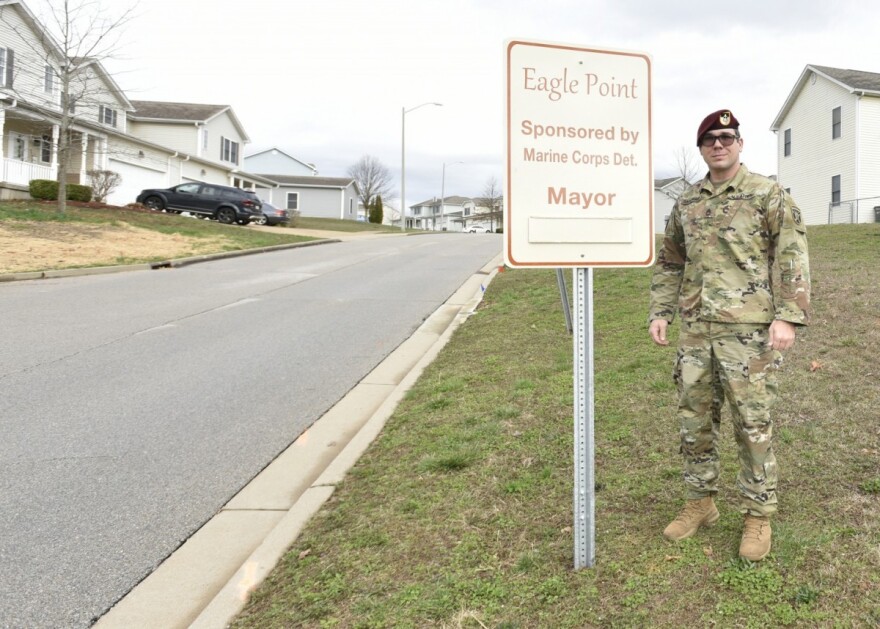Fort Leonard Wood is bringing back its neighborhood mayor program in an attempt to improve life for the 15,000 soldiers and family members who live on the nearly 100-square-mile Army installation in the Missouri Ozarks.
The move comes as criticism of on-base housing across the country continues.
A report from the Government Accountability Office in March concluded that oversight of maintenance and conditions at housing at military bases remains too limited to ensure that soldiers and their families aren’t living in substandard conditions.
In 2019, the leaders of the U.S. military services went before Congress and apologized for the living conditions in military family housing.
The mayor program, currently in use in about a one-third of Army installations, is one way the problems might be fixed.
“I grew up as a military brat,” said Col. Jeffrey Paine, Fort Leonard Wood’s garrison commander. He’s new to Missouri, having arrived late last year. He said in previous assignments, he saw the mayor program do a lot of good.
“Most of the neighborhoods in military communities I grew up in were pretty tight knit. We knew our neighbors, and we knew them well. And so there is a lot of that we would like to provide the opportunity to bring back,” Paine said.

Paine reinstated the mayor program that ended at Fort Leonard Wood in 2015. Each of the six neighborhoods on post has elected a mayor. The mayors will meet regularly with each other, commanders and Balfour Beatty, the private company that manages on-base housing.
But the program isn’t just about good feelings; it’s also about basic maintenance and safety.
Emma Keys, her soldier husband and their kids lived at Fort Leonard Wood until they were reassigned earlier this year. She calls her on-post housing experience “a nightmare.”
Keys said they endured ant and cockroach infestations and a mold problem. After she filed complaints, Keys said Balfour Beatty sent out a crew last spring that said it took care of the problem.
“Then, in July, I found more mold. Our daughters shared a bedroom, and it was underneath their windowsills, growing down the wall,” Keys said.
The mayor program might have helped, she said.
“If they could have bypassed Balfour Beatty and gone directly to the garrison commander, then yes,” Keys said.

The mayors who have been elected say that is definitely part of their job. Sgt. 1st Class Max Saalman, elected mayor of the Eagle Point neighborhood, said just a couple of months in, the residents he represents haven’t been shy to tell him about problems.
“They’ve said they’ve gone to Balfour Beatty, but sometimes things just get lost in the craziness of the day,” Saalman said. “Now they have a centralized voice that they send me a message, I write it down, and then I kind of prioritize it. If it’s public safety, I make an immediate phone call.”
Saalman said that as mayor, he has the authority to bring concerns to upper management at the housing company or to the garrison commander.
Paine said that’s exactly what he wants and how the mayor program is supposed to work. He is also planning what he calls a Walking Town Hall, in which people in charge walk through neighborhoods and hear directly from the soldiers and families who live on base.
“They can come out of their homes and tell us, ‘Hey look at this, I’ve put a request in to fix this maintenance problem, and I can’t seem to get it fixed.’ And then we have all the right people there to be able to immediately address it and get the resources applied to fix the problem and make it a great, great place for that family to live,” Paine said.
And while addressing maintenance and repair issues are definitely important, Paine wants to underscore the mayors’ ability to help create that sense of home he wants soldiers to feel.
Staff Sgt. Ty Fogal moved to Fort Leonard Wood just two months ago, but he ran for mayor of the Stone Gate neighborhood. Fogal said in addition to helping his neighbors with any problems, he wants to lead by example.

“There’s a sense of continuity and responsibility for everyone. This is my foxhole, this is my area, so I’m going to actually take care of it and make sure everyone knows, this is Fogal’s house,” he said. “I want it to look good. He’s doing a really good job. So I think everyone wants that sense of ‘I’m doing a good job.’”
For all of the early success of the mayor program, keeping it going will be the challenge. Most soldiers stationed at Fort Leonard Wood stay for 18 months to three years, including the garrison commander.
The goal is to make the program so successful and essential that it becomes part of Fort Leonard Wood’s culture, even after its current participants have moved on.
Follow Jonathan on Twitter:







